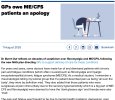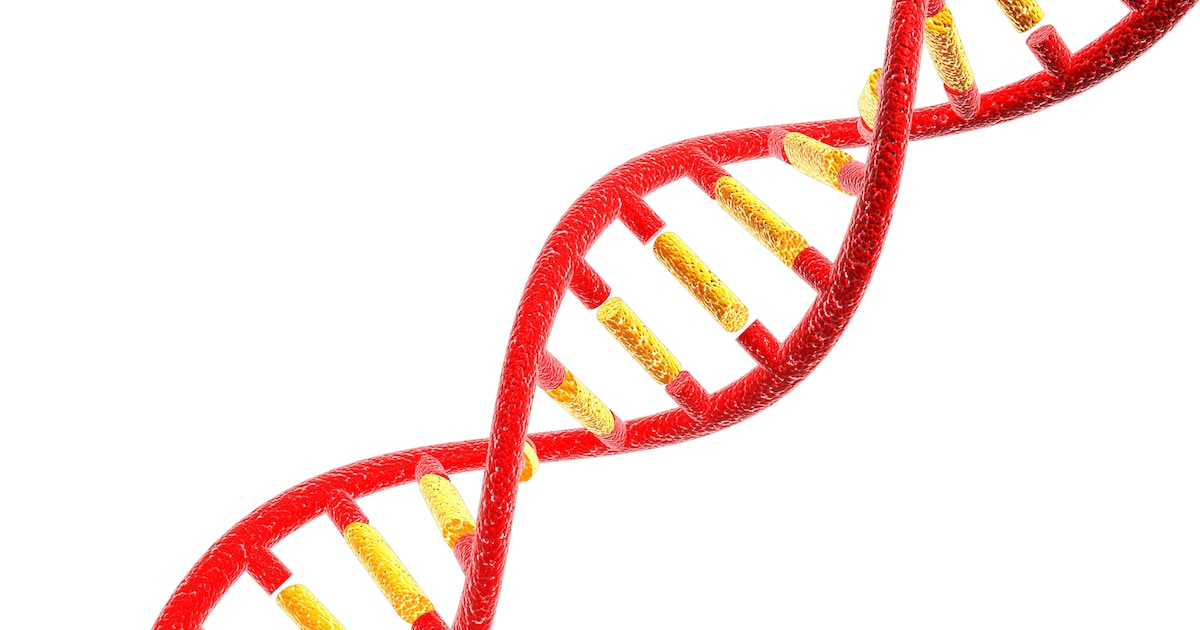AI translation of the article:
CHRONIC FATIGUE
Possible Genetic Background of ME/CFS Identified
DNA analyses of more than 15,500 affected individuals have identified eight preliminary genetic signals. This provides increasingly clear evidence that the disease does not have a psychological origin.
By Pia Kruckenhauser
August 12, 2025, 09:00
People with ME/CFS have severely impaired capacity. About a quarter of them cannot even leave their homes. Many others are unable to hold a full-time job. Extended computer work or driving causes their concentration to completely vanish.
It is a disease that affects around 80,000 people in Austria—with a potentially higher number of unreported cases—but cannot be clearly diagnosed in practice. ME/CFS, Myalgic Encephalomyelitis / Chronic Fatigue Syndrome, is currently diagnosed only by exclusion, since there are no definitive biomarkers that can be clinically tested. Since the Covid-19 pandemic, the number of affected individuals has reportedly doubled or even tripled—it is considered a form of Long Covid. This has contributed to research on the condition being ramped up in many countries.
Recently, possible indications in the gut microbiome were found; now, another study has been published showing genetic anomalies that may be responsible for ME/CFS. The publication is a preprint and has not yet been peer-reviewed.
This is the largest DNA study in the world regarding this disease, which presents with, at times, quite unspecific symptoms. Typical are neurocognitive and immunological symptoms like rapid heartbeat, dizziness, lightheadedness, fluctuating blood pressure, headaches, muscle and joint pain, gastrointestinal problems, issues with concentration, memory, and word-finding (a kind of “brain fog”), sleep disturbances, and hypersensitivity to sensory stimuli. Symptoms vary among individuals, complicating diagnosis.
The most typical symptom experienced by nearly all patients is post-exertional malaise (PEM): a pronounced and persistent intensification of all symptoms after minor physical or mental effort. This leads to severe weakness, muscle pain, flu-like symptoms, and an overall deterioration in condition. PEM can be triggered even by minor exertion—small activities such as brushing teeth, showering, cooking, or taking a few steps can become an ordeal, and a trip to the supermarket can mean days of bed rest afterward.
Triggered by Viral Infection
To uncover possible genetic traits, researchers analyzed the DNA of over 15,000 affected individuals, identifying eight genome regions associated with ME/CFS. Some overlap with genes related to the immune response to infections, or are located nearby. This is notable since the disease is practically always triggered by (severe) viral infection. In principle, any virus could trigger ME/CFS, such as influenza, but it is particularly common after Epstein-Barr or Covid infection—hence the considerable increase during the pandemic.
“The study confirms ME/CFS as a biomedical disease. It is also an important correction to the psychological view of the disease, which often assesses the symptoms as psychological problems,” says Jos Bosch, biopsychologist and epidemiologist at the University of Amsterdam, who advised the project but did not participate in the research. Although this type of genetic study cannot definitively determine the causes, the identified areas of the genome merit further investigation, he adds.
For a long time, people with ME/CFS had to fight against the assumption that their illness was psychological rather than physical, writes the journal Science in an analysis of the study. Previous attempts to determine genetic causes or risk factors for ME/CFS were hindered by small participant numbers and broad or inconsistent diagnostic criteria. The goal of the current project, funded with £3.2 million by the UK government in 2022, was to overcome these hurdles with the largest genome-wide association study (GWAS) to date. The so-called DecodeME analysis was carried out with the participation of patients, caregivers, and charities.
Questionnaire and Saliva Sample
Through online marketing, social media, and other recruitment efforts, the team engaged more than 26,000 people to complete a questionnaire about disease symptoms and other information. Some 21,000 reported having received a clinical diagnosis of ME/CFS from a doctor, experienced discomfort after physical activity, and had other symptoms matching standard diagnostic criteria for the disease. Around 18,000 also submitted a saliva sample for DNA testing.
For their analysis, researchers examined the samples of 15,579 participants of European descent, comparing their genomes to healthy participants from the UK Biobank study. In particular, the team looked for single-nucleotide polymorphisms (SNPs)—differences in individual DNA bases—that could distinguish the two groups.
By combining multiple analyses, the researchers ultimately identified eight DNA regions that differed significantly between the groups. These included regions containing genes or near genes involved in neurological and immunological processes. One such gene, OLFM4, codes for a protein called olfactomedin-4, which is involved in the body’s antimicrobial responses. Another, ZNFX1, is linked to responses to RNA viruses. A third highlighted gene, CA10, is associated with chronic pain.
The team also searched other national biobanks with ME/CFS patients for the same genetic associations. Many results could not be reproduced, though there was some correlation with fatigue after exertion for four genes—including OLFM4 and CA10—among British Biobank and a Dutch cohort. These discrepancies might be due to different criteria defining the disease, says study co-author Chris Ponting, a human geneticist in Edinburgh.
Abandoned by the Medical Establishment
Doug Speed, a statistical geneticist at Aarhus University who was not involved in the work, rates the team’s approach positively but emphasizes that the genetic associations explain only a small part of an individual’s ME/CFS risk. Most variation remains unexplained. “That’s largely to be expected,” he told Science. For many human diseases, “the risk is influenced by many thousands of genetic variants, each of which has a minuscule effect on its own.”
More than 85% of participants consented to sharing their data with other approved researchers, reports the DecodeME team. Sonya Chowdhury, CEO of the British charity Action for ME and co-author of the preprint, adds: “Our findings give the experiences of people with ME/CFS credibility and validity. Still, there is much to be done to develop treatments.”
This study represents an important step for the community. Many feel abandoned by the medical establishment, emphasizes Andy Devereux-Cooke, himself affected by ME/CFS and involved in patient and public outreach for the DecodeME study: “Even though the research does not provide all the answers or practical help, it is nevertheless a welcome drop in the ocean to help turn the tide.”
The project is part of a remarkable increase in ME/CFS research in recent years. This is due to increasingly active patient advocacy, the waning of psychological and behavioral explanations for the disease, and the emergence of new awareness due to its similarity with Long Covid, says biopsychologist Bosch. He and his team, together with patient organizations in the Netherlands, are conducting a large-scale study on ME/CFS, Long Covid, and other post-viral conditions. The project, with several hundred participants so far, will analyze muscle and post-mortem brain tissue as well as brain images from patients. (Pia Kruckenhauser, 12.8.2025)
- https://de.wikipedia.org/wiki/Myalgische_Enzephalomyelitis/Chronisches_Fatigue-Syndrom
- https://pmc.ncbi.nlm.nih.gov/articles/PMC9281337/
- https://pmc.ncbi.nlm.nih.gov/articles/PMC11093804/
- https://www.usz.ch/krankheit/chronische-muedigkeit/
- https://www.mecfs.de/was-ist-me-cfs/pacing/
- https://www.iqwig.de/download/n21-01_me-cfs-aktueller-kenntnisstand_abschlussbericht_v1-0.pdf
- https://www.mecfs.de/was-ist-me-cfs/
- https://mecfs-research.org/was-ist-me-cfs/
- https://www.gesundheitsinformation....halomyelitis-chronisches-fatigue-syndrom.html
- https://immunologie.charite.de/fileadmin/user_upload/microsites/m_cc12/immunologie/Immundefekt-Ambulanz/CFS_eine_unterschätzte_Erkrankung.pdf







